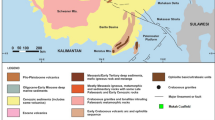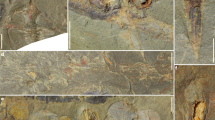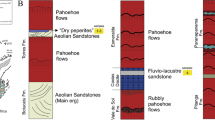Abstract
THE microscopic examination of coals can provide valuable information on their mode of formation. The works of Teichmüller1 and Thomson2 on the Rhineland brown coal are notable examples. Apart from the investigations of Kremp3 and Smith4, little of the published work on the possible origin of the different petrographic types of coal takes account of the evidence provided by the plant spores in coals of Carboniferous age.
This is a preview of subscription content, access via your institution
Access options
Subscribe to this journal
Receive 51 print issues and online access
$199.00 per year
only $3.90 per issue
Buy this article
- Purchase on Springer Link
- Instant access to full article PDF
Prices may be subject to local taxes which are calculated during checkout
Similar content being viewed by others
References
Teichmüller, M., Geol. Jahrb., 64, 429 (1950).
Thomson, P. W., Geol. Jahrb., 65, 113 (1951).
Kremp, G., C. R. Congr. Strat. Carb. Heerlen, 1, 347 (1952).
Smith, A. H. V., Geol. Mag., 94, 5, 345 (1957).
Richards, P. W., Comm. Brit. Ecol. Soc. (Jan. 1960).
Teichmüller, M., Fortschr. Geol. Rheinld. u Westf., 2, 599 (1958).
Author information
Authors and Affiliations
Rights and permissions
About this article
Cite this article
SMITH, A. Palæoecology of Carboniferous Peat Bogs. Nature 189, 744–745 (1961). https://doi.org/10.1038/189744a0
Issue Date:
DOI: https://doi.org/10.1038/189744a0
Comments
By submitting a comment you agree to abide by our Terms and Community Guidelines. If you find something abusive or that does not comply with our terms or guidelines please flag it as inappropriate.



